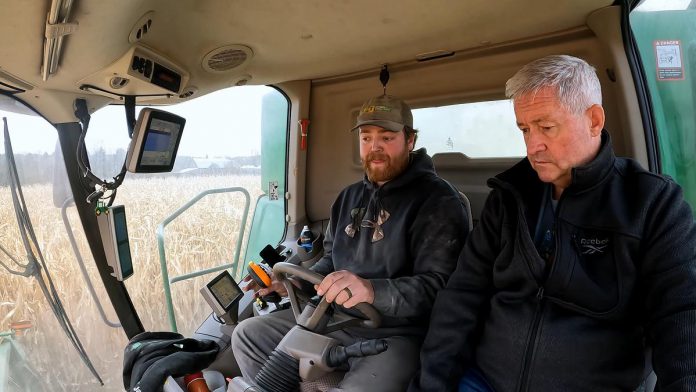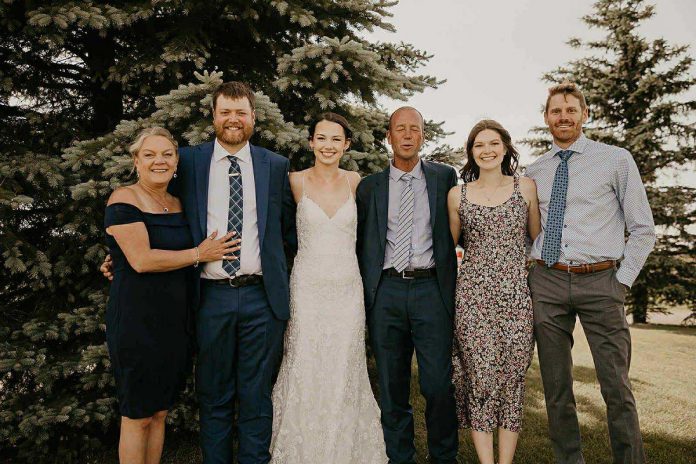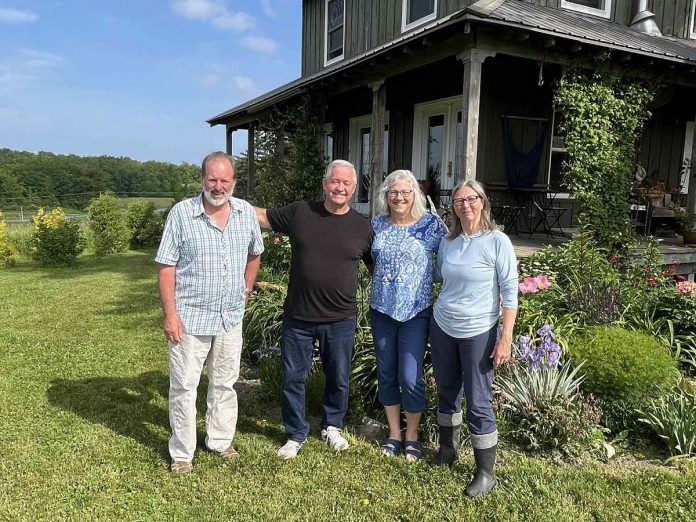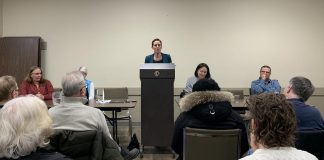
Sometimes planting a single seed of generosity can grow into a whole field of kindness. That’s how a Millbrook farmer’s offer to take tourists on a combine harvester eventually led to funding the education of Emmanuel, the 12-year-old son of a Kenyan farmer, through Millbrook resident David McNab.
McNab has spent the past year filming life on the Millbrook farm for the Ontario Federation of Agriculture, with proceeds from sale of the footage funding a scholarship for Emmanuel.
“It’s a very fitting and wonderful thing when kindness is returned,” McNab says. “You do something out of kindness, you don’t intend to get anything from it, and yet everybody’s benefiting from this. It’s just a wonderful feeling and experience for everybody and nobody was looking to get anything for themselves.”
While there are many layers of generosity to the story, it begins in the Galapagos Islands when McNab and his wife Kristy Hiltz learned to scuba dive while on vacation. Later, they had scheduled a holiday to visit one of their instructors, Christian, but given that his daughter had fallen ill with cancer, it was Solon Intriago who took them in without asking for payment.
“He just loved Christian so much and wanted to help, so he put so much time and effort and expense into giving us a great holiday,” says McNab. “It was a really neat experience because all three of our families then became very tight and very bonded by this generosity that we had been shown.”
In October 2023, McNab and Hiltz returned the favour by inviting Intiago and his family to visit Canada for the first time. One day when the group was passing a neighbouring farm, they saw Squirrel Creek Farm owners Steve and Chris Brackenridge using their combine to harvest soy. Though the two farmers had never met the group before, they invited Intriago’s young daughters to take a ride on the machinery.

“We were touched by that, and it was a wonderful experience for his daughters — he was very grateful,” says McNab. “It was beautiful the way it promoted our Canadian culture, and how we see ourselves as generous and welcoming.”
Solon is a farmer himself, though his method of farming looks much different than what he experienced on the Brackenridge farm given he grows food in a climate where there is a shortage of both soil and fresh water. His family has a property on Santa Cruz Island in Ecuador, which is formed by a volcano with lava rock as the base. Without much soil to work with, he is required to use a pick axe or shovel and create a hole in which to put soil to grow food for his family and to sell for extra income.
“It’s a struggle to produce food there, but it’s in little bits and pieces, so for him to see these huge combines and acres and acres of farmland — he had never seen anything like that in his homeland,” McNab says. “The big wow factor was looking at these massive machines cutting soy on a massive scale.”
To pay back the Brackenridges for their kindness that day, McNab used his drone to take photos and videos of their farm. When Steve saw the footage, he asked if he could pay McNab to film even more.
McNab agreed, but asked that all payment to be donated to Emmanuel’s adoptive mother Naomy, a farmer in Kenya who McNab and Hiltz have been connected with for several years.
And so, from spring 2024, McNab collected hours of footage on his GoPro and drone over four seasons of operations at the farm and learned a lot in the process.
“I got this insight into farming,” he says. “It’s more complex than I ever would have dreamed.”
VIDEO: A moment of kindness led to a much-needed education on food production
McNab learned about all that’s involved with operating a farm, including the intricacies of the costs, environmental impact, and how to use the equipment. One of the things that stuck with him most how the cost of the grain they produce is set by world markets and cannot be adjusted based on poor weather or other factors that affect operations.
“They are locked in when it comes to farming,” he says. “They plant in the spring and hope for a good crop, but if weather or problems with their machinery make that more difficult, they’re stuck with however much food they produce at a price that’s set by the world markets, and if there’s money left over, then they have enough for themselves, but the risk is huge.”
“The amount of control that they have over their prices is much less than we would have ever thought, and there’s no room for error. They have to have a complete understanding of how a crop will grow, how it will respond to climate, what the climate is doing. That’s not something most of us have to face … the huge risk, huge debt, and they’ve got less control than we would assume.”
Another major lesson that stuck with McNab was that farmers can’t use electric combines, leaving them unable to avoid carbon taxes — and those are costs that will not be later covered by the consumer.
“They’re expected to just somehow work harder, somehow work faster, to make up for that, and if the consumers and our government and everybody else keeps putting greater demand on the farm, it has to come out of the farm’s pocket or it’s more effort that they have to put in,” McNab says. “We all picture them out there working long hours and no holidays, but we probably don’t fully understand exactly what that means, until you find yourself in the middle of it and you watch it.”
While he says he has always felt “a sense of responsibility in buying from local purveyors,” in part driven by environmental concerns, McNab hopes compiling and educational video about farming will educate buyers on the challenges faced in the industry and ultimately consider buying local produce and goods.
VIDEO: Kenyan woman and ex-cop form unusual business partnership
“Why wouldn’t we buy local so that we can try and pick up some of the slack and repair a little bit of damage done by the relationship with the States?” he says, referencing the current trade war.
“It would also be tragic to lose more farms, and to have more farmers have to give up and sell their farms because they can’t make a profit,” he continues. “I think it must be heartbreaking to not feel that there’s loyalty, that (it’s) your own problems or your own (country) wouldn’t support you in your time of need.”
Upon completion of the video, the Ontario Federation of Agriculture inquired about purchasing the additional footage McNab captured throughout the four seasons.
The profit from that sale has also been donated to Naomy. When she was young herself and struggling to feed her grandparents through her farming, Naomy took in Emmanuel, who had been abandoned at two years old. McNab was drawn to her selflessness.
“She just thought it was the right thing to do to take him in and look after him,” he says. “She lives in a world where it’s pretty hard to look after yourself, and yet she took on another mouth to feed.”
Since they connected, McNab has been helping Naomy by hosting various community fundraisers, including auctioning off charcuterie boards and helping another neighbour, Millbrook beef farmers Catherine Ives and Dave Kennedy, hold a calf-naming contest to raise funds to cover Emmanuel’s schooling.
“A young man in Kenya finally feels like somebody believes in him enough that he has an education ahead of him,” says McNab. “I just think that’s neat that he can feel that now thanks to everybody here.”

The money from the video footage is enough to create a scholarship fund that will cover close to the remaining six years of his schooling until Emmanuel finishes high school.
But given that Emmanuel walks three kilometres to school and back every day, which causes his shoes to wear down quickly, McNab has also launched a GoFundMe with a goal of raising $800 to purchase new shoes, school supplies, and potentially even Emmanuel’s first bicycle so he can ride to school.
“Between the Brackenridges, the Ontario Federation of Agriculture, and Dave Kennedy and Catherine Ives, almost all of Emmanuel’s schooling has been supported by the farm community locally here in Millbrook and Ontario,” McNab says. “That’s pretty magical.”


























